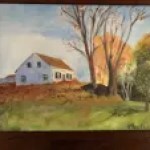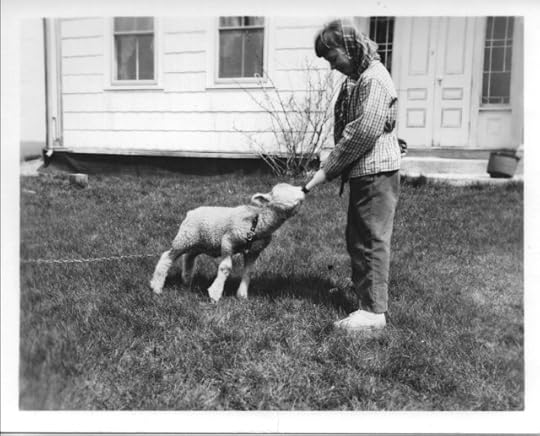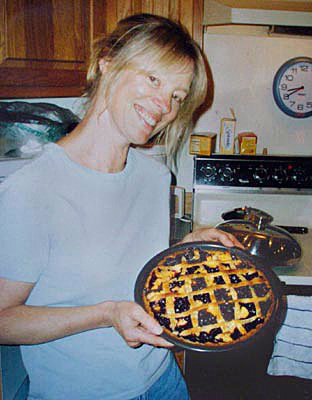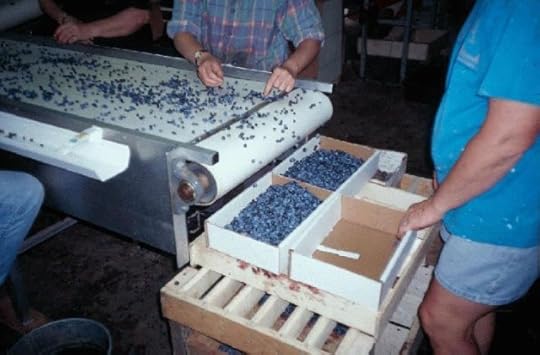Remembering Summers Past

The farmhouse on Sennebec Hill, painting by Karin Rector
Kate Flora: Starting another Maine summer always makes me nostalgic for the summers of my youth. Yes, it’s true that we always think we are eighteen forever, unless it’s twenty-seven, but now I’m at the stage of life where I can say things like, “It’s been sixty years since I got my driver’s license” or “Was that really half a century ago?”
Recently, I was clearing out a box that had come out of my mother’s attic, and I found my old prom dresses. There was the one that I made from upholstery fabric that I took to 4-H state dress review. A pink satin dress with a wide white tie at the waist. A purple one that I think I wore to a prom in Camden. My school was too small to have a prom. Sewing was something I was always doing. My mother, who was clever (and we didn’t have any money) would always say, when I admired some piece of clothing in a store, “You can make that more cheaply.” I don’t think my taste was very good, as I remember making an orange vest and straight skirt that I wore with a purple blouse.

Sheep farmer Kate
Wrap-around skirts were also one of my summer projects. The summer I was taking driver’s ed, the teacher required all the girls to wear skirts, so I made one that I could wrap over my shorts. Unfortunately, I used to put it on just before I got in the car, which I am sure she resented. In any case, I know that she hated me. And that rattled me so much that when I took my driver’s test, I bumped the car behind me while parallel parking. I did get it on the second try.

Pie from my Union blueberries.
Summers on the farm meant no school, a lot of reading and swimming, and on many days, a typed chore list from my mother. Whatever was on that list had to be done before we go down to the lake and swim. I guess from her point of view, it was a great way to get things done and keep her three children occupied. I certainly never considered that other children didn’t get those lists. It’s always a surprise when you leave home and learn about other people’s families and discover that their lives were radically different. Did the girls I met later in life iron all the sheets, table cloths, my father’s handkerchiefs and tee shirts? Did they pull an entire row of weeds in the hot summer sun? Did they have a chicken hospital where they tended to wounded chickens and nursed them back to healthy? Did their family have a white chicken named Asabanana who rode around on the back of a steer named Raisins? Probably not.
Summer nights were often spent preparing for “the long, cold winter.” Pitting cherries, snapping beans, shelling dried shell beans, making applesauce, canning pears or plums. When my parents’ friends were visiting from New York and New Jersey, they would join in, everyone sitting around a big table, hands busy, talking. When that was done, we’d clear away the food and play cards. I can’t remember the rules for Oh Hell, but I logged in many hours playing it.

Blueberries coming off the belt
I doubt that many of the girls on my floor my freshman year at Jackson (Tufts) had raked blueberries or worked in the blueberry processing plant picking clods of dirt, spiders, leaves and other oddities out of the berries as they rolled past on a conveyer belt. It was the quintessential agricultural work: we stayed as long as there were berries to be processed, whether that was five or eight or one a.m. They probably hadn’t been a housekeeper at Whitehall Inn in Camden or worked one summer on Islesboro as a maid for an eccentric millionaire. That summer was quite the revelation about how the 1% lived. There was a cook and her assistant, a captain to manage the boats, the nanny who had little to do looking after indulged fourteen year old twins, and three of us local girls hired for the summer.
Every night, the beds had to be turned down, and we had to carry an iron to ensure that the folded down sheet was perfectly smooth. In a pocket, we’d carry cans of Brasso and cleaning rags because the doorknobs and other fixtures in the house were brass, and quickly tarnished by the sea air. The three of us had uniforms. In the daytime, stretch jeans and burgundy sweatshirts. In the afternoons, Lacoste dresses. In the evening, if there were guests and we were serving, strange hippy dresses that our boss had sourced from some hippie seamstress in Camden. There were several dogs underfoot that were not housebroken, so that while we prowled around with our Brasso, polishing up the fixtures, we also patrolled the floors in case one of the animals had had an accident. Accidents were very common!
Wow! I didn’t expect to be taking this trip down memory lane. But there it is. Working since the age of thirteen, and lucky enough to have grown up on a hill, beside a lake, in a small town where everyone knew each other. And had secrets. And gossiped. And gave me a lot of fodder to become a writer.
Lea Wait's Blog
- Lea Wait's profile
- 508 followers



